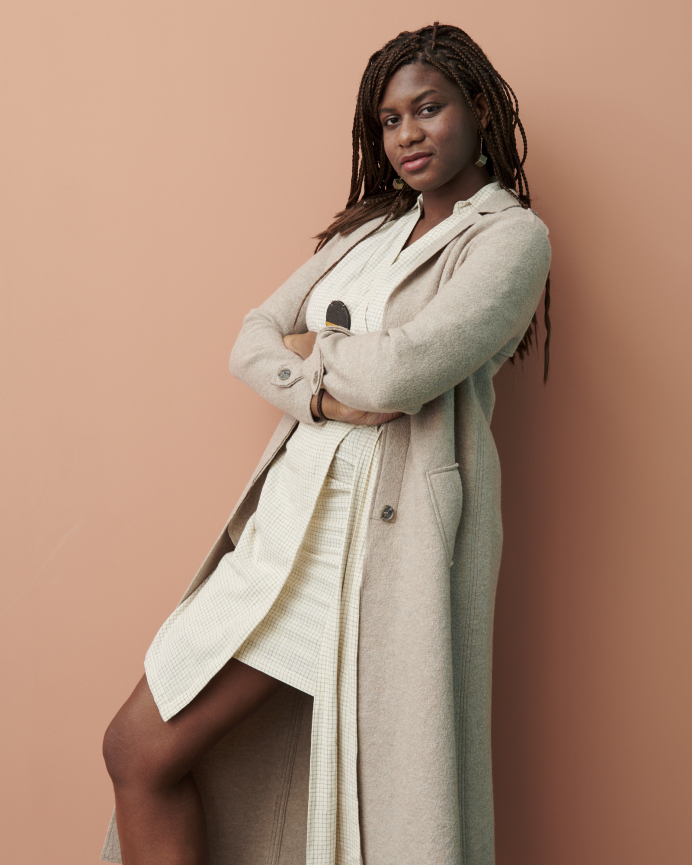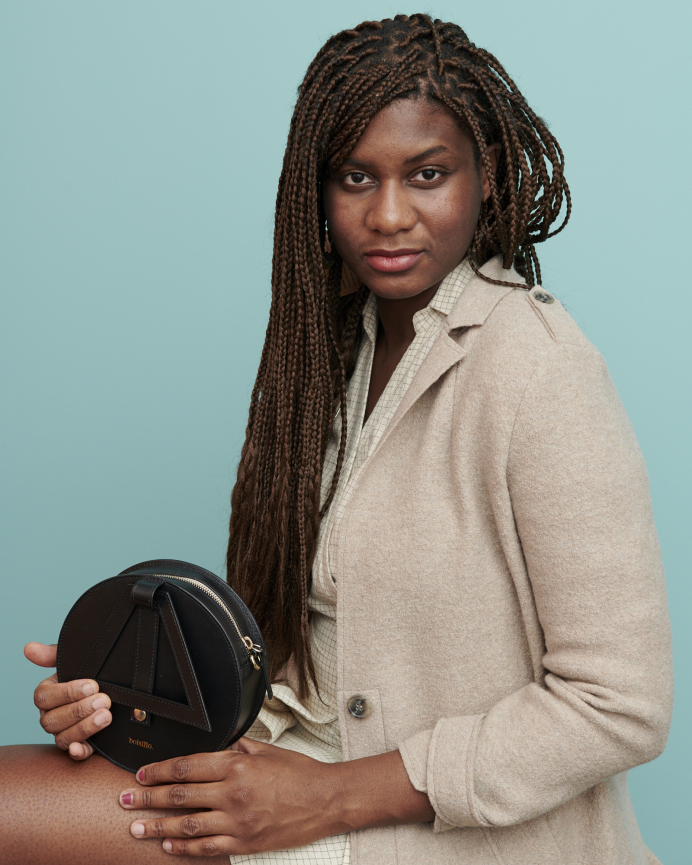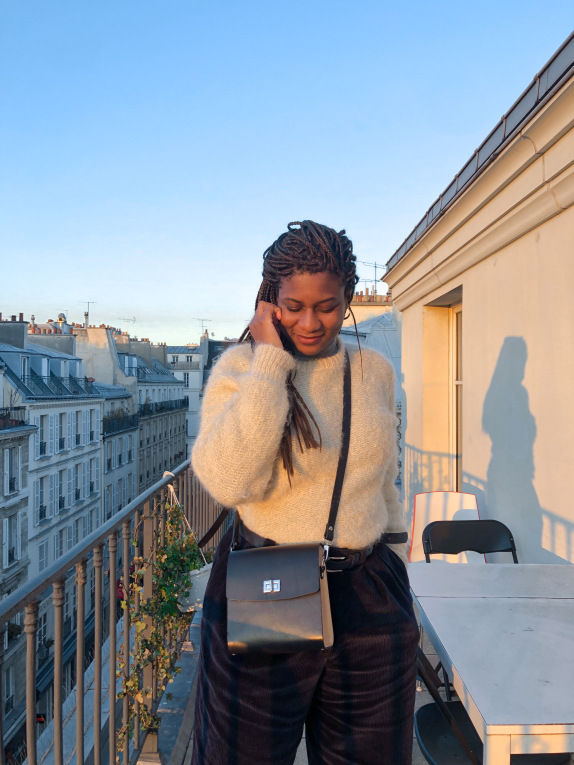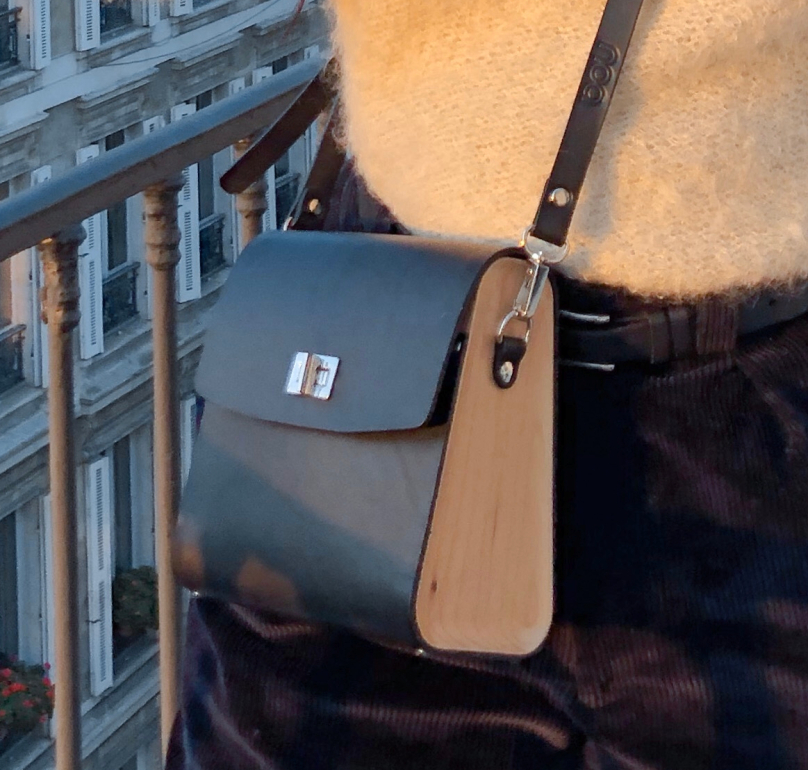Three intense days in meetings, discussions, learning with different actors of responsible fashion. A unique opportunity that allowed me to discover interlocutors engaged and passionate about their profession and the desire to improve everyone’s daily life.

Frenzy. This is the first word that came to mind when I entered the Hangar.

Unique encounters and inspiring stories. I learned a lot about eco-responsibility but also about those people behind the creation of these magical brands.
Fashion Look at Prepeek

For less than an hour, I had the chance to participate in the Prepeek workshop, where a great photoshoot had been organized. The idea was to capture some photos of looks highlighting several eco-responsible brands. Thank you again to the whole team who made this experience very rewarding.
Dress: Khara Kapas
The necklace: Beatriz Constan
The bag: Bolsillo
The coat: Lana
Stylist: Christianna Quack
Photographer: Maria Dominika,
Photographer: Sarah Hartgens
Discovery of favourite brands
I was not able to meet all of them, so I preferred brands that were close to my own values, namely, respect for the working conditions of employees and the environmental dimension of the manufactured product (carbon footprint, material used).
HempAge

A fair trade company has a fashion brand using hemp for over 25 years. Robert, founder of HempAge had a simple goal. Give it to others. His motivation and selflessness, which he demonstrated with various NGOs, attracted to him nature, which ended up being his best sidekick. Hemp, a cannabis-derived plant, has many advantages in medicine as well as in clothing. It is a complex subject to use and that is what attracted the founder.
Their collection: As clear as the name of their brand, (Hemp – Hemp), the garments are mainly composed of hemp.
The “empowered” brands
Bridge – Tunnel

Constanze and Hanna worked together in a textile workspace in Williamsburg.
They heard about a Turkish sewing workshop and decided to invite it one a month to their workspace.” This workshop was open once a week on Wednesday mornings. Who has time to go to work on a very early Wednesday morning?” says Constanze.
Amazed by the quality of their work, they decide to merge their talent with their idea of upcycling. And that’s how Bridge-Tunnel was born. “We want to create a tunnel for the people who work for us,” says Constanze.

Their collection: Bags, cushions, jackets, shirts… all upcyvelled from denim. This denim is recovered from large garment recovery factories, the equivalent of the relay or the fiber of sorting in France.
Their own: Bridge – Tunnel brings a social dimension by welcoming refugees who have just arrived in Germany to their production team.
A Beautiful Story

Cathelijne Lania, the founder, needed to change her life. She wanted to do something that made more sense than marketing coffee to shareholders. One day, his mother called him. Their friend, who ran a metallurgical factory in Nepal, was forced to lock the door. There was not enough work to provide. As
a result, a dozen employees were at risk of losing their jobs. For Cathelijne, it was a sign. She couldn’t leave these women unemployed. So she went to Nepal and bought several jewels without knowing exactly where it will take her. She told this story to several groups of people who pushed her to create Beautiful Story. And today this story has seduced hundreds of thousands of people. Her jewellery is present in more than 600 stores across Europe and Australia.
Their collection: Each stone has its own way of healing and or spreading a positive energy. Some bring courage, others previous peace or protection. These different stones can be found in bracelets, necklaces, or earrings.
Their plus: The brand allows more than 20 employees to have healthy working conditions and provide for their primary needs for themselves and their families.
Anzueglich

In 2007, Bawi, founder of Anzueglich, decided to create her own brand. But she didn’t want to do it anyhow. She wanted her clothes to be designed under several conditions:
– Made from organic materials
– a production line where the carbon footprint is minimized
– ensure that its employees work in the right conditions
She decided to go to Peru where she heard about an NGO that included a workshop of deaf seamstresses. She went to meet them and began to communicate about the designs she wanted. Proof here that passion and technique can be transmitted and reproduced despite disabilities.
Today, Bawi works with 20 employees in Peru and 6 in Austria.
Their collection: The main materials used are organic cotton.
Their plus: Thanks to its brand, employees benefit from social protection and a decent wage.
Juan Arias
Juan grew up surrounded by a family of artisans who have always worked in the textile industry. So it is almost natural that he decides to create his own brand provided that it respects certain values: ecological and ethical from the point of view of suppliers, employees, seamstresses and consumers. A gamble tha
t he succeeds by associating with craftsmen with which he has developed an almost fraternal relationship.
Their collection: Clothes are made from pima, a cotton that has been used for more than 5000 years and comes from Peru.
N’Go Shoes

After working in several NGOs, Kevin and Ronan decided to continue on the same idea: to create a social project more than a simple brand in order to have an impact on people’s human conditions. Kevin lived in Vietnam for 5 years and was able to ensure that both the production and the condition of his employees was healthy at all levels.

Their collection: leather/suede, polyester and vegan shoes. Lea
ther sneakers are made with a tanner who has his own internal water treatment system to reduce water pollution. In addition, most of their leather is As far as polyester is concerned, N’Go shoes promises to switch to recycled polyester as soon as possible is tanned without chrome.
Chromium is a very dangerous and harmful material for the environment. That’s why most eco-responsible brands favour plant tanning
Their own: N’Go Shoes collaborates with the NGO Sao Bien, which promotes education in poor areas of Vietnam. The brand has already helped build 3 schools, the last of which in 2019. This project has resulted in the enrolling of nearly 160 students.
Bag Affair
In business, nothing forbids having style while being true to its values. This is what Taiseer and Ronja, the founders of Bag Affar, decide to apply. Their idea is part of a real need. They were looking for business bags that were not made of leather or PVC. The phrase “Being better served than by yourself” has never made as much sense as in this context.

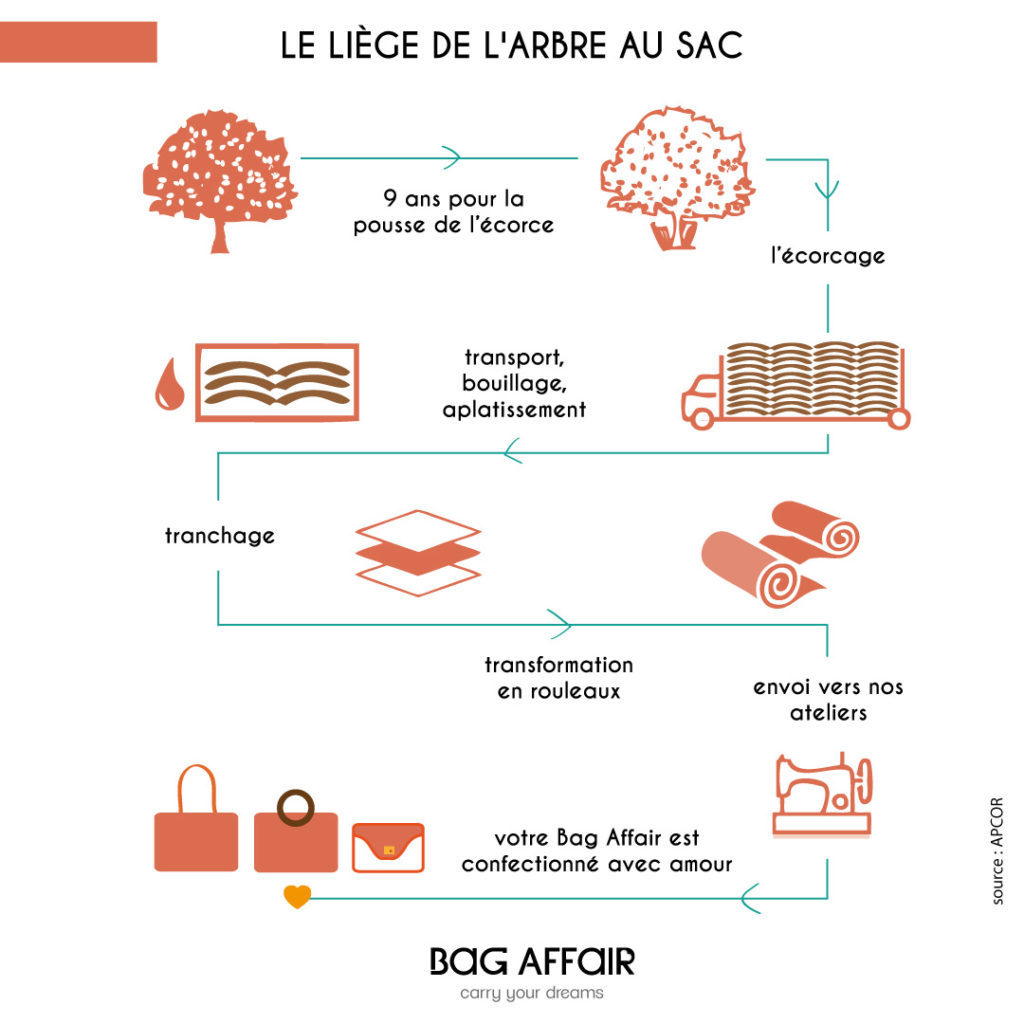
They find their happiness in Portugal with cork, a very resistant, durable, biodegradable material and full of other properties that are indisputable.
Their collection: these are vegan bags made from cork Innovation constantly at the heart of the subject
Their plus: The entire production line is carried out in Europe.
Simple and minimalist
Organic Basics

In 2015, 3 students decided to launch their own company. They’re looking at the men’s lingerie market. They have a problem: the boxers did not meet their needs: the materials used were derivatives of plastic. So they launched in a first of the boxers that responded to a minimalist and environmental mode. F
ollowing the success of the boxers, women also wanted to see their range.
Alexander, Christoffer and Mads then went to San Francisco to set up their project. They are launching a crowdfunding campaign that was funded in… 24 hours.
Their collection: Their underwear is made from organic cotton produced in the first eco-friendly factory in Turkey. Their cotton also comes from factories in Portugal Today, elastane is still present in their collection but they are constantly looking to replace this material. The founders visit their factory every 3 months.
They are 1% partners for the planet whose principle is to donate 1% of its turnover to environmental associations.
Widda

After winning a competition, Sabine, founder of the Brand Widda has access to free premises in which she will create her brand immediately after graduation. “A fashion brand wasn’t the first thing I had in mind, in reality I didn’t want to get into this type of sector that was too commercial for me for my liking”
Their collection: their clothes are produced in Germany and Poland. The materials used for his collection much with lyocell and Tencel, modal, GOTS certified cotton
Nago
At first, his collection consisted of bodies and today, Nago spans a wide range, with tops, stockings and sportswear all minimalist and casual.


Their collection: The materials used are mainly copro, organic cotton and tencel. To go further, the coconut shell are used for buttons (see photo)
The sweaters are made from recycled cashmere.
Their plus: The brand is still looking to find the right NGO by the end of the year with which it will be in partnership
Artists
RHUMAA

I was amazed by this Dutch brand that not only offers pieces with impeccable quality but collaborates each season with a different artist.
This season, Andrew Sutherland’s works appear on the Rhumaa collection. His paintings will be repeated on the suits. This painting describes the immensity of nature in front of man who is small next to it. (there is a man drawn on the rock at the bottom right).

Their collection: The majority of their clothes are made in Portugal. They mainly use materials such as organic cotton, cupro and merino
Their own: Rhumaa created her own foundation by collaborating with an NGO called “The Beach Coop”. It is an association from South Africa that recycles, reuses plastics found on beaches.
Noa Complements
Noa Complements was born out of a challenge launched by The Spanish Bodega “Ramon Bilbao” for “TBK Bike”: to produce a bike from the French oak barrels where their wine is stored. This bike would be used for a trip and it was necessary to add a bag that would accompany it. This is how Noa Complements was born.
Their collection: The brand now has two collections; a leather and a leather
veganLeur comes from cattle destined for human consumption, so it is a matter of recycling an organic material that would have
no use. The wood comes from beech fields with closed growth cycles. For every tree cut, a minimum of four trees are planted. Wood bears the PEFC label (Promoting Sustainable Forest Management)
Their plus: Nao Complements is part of several associations (Spanish ecoresponsible fashion association, AECC (Association against Cancer) and NGOs including “Plant For Planet” and “Ecologistas en Accion” which plants trees.
Avasan

I realized that Amy, founder of Avasan, had a passion to pass on in the story of every piece Amy created. Nearly a century ago, kimonos were still worn in Japan, a traditional garment. Today, kimonos are worn only on special occasions or events. So what happened to those unworn kimonos? Most are buried in a suitcase or discarded. Recycling applies everywhere and kimonos have not been spared, fortunately. The brand Refull and Avasan have collaborated together to give birth to this unique collection where Kimono and modernity meet.

Their collection: Their autumn-winter and previous collection are mainly made from organic cotton, recycled clothing (like kimonos), merino
Their plus: Avasan is a member of the association AMSE- Associacion Espa’ola de Moda Sostenible
Mahla Clothing

Mahla Clothing was born from a project, a project that Titty the founder started alongside her work as a model in the world of theatre and
cinema. The available eco-responsible materials used by brands are very often the same: organic cotton, hemp, cupro, etc.
Their collection: All his pieces are completely upcycled. Clothes are mainly produced in Copenhagen, Denmark or in a small sewing workshop in Tallinn, Estonia.Th
e privileged colors are sparkling, vivid because for the founder, it is a way to proclaim diversity. The materials used are hemp, lyocell, organic cotton, organic linen and recycled materials.

Their plus: Mahla Clothing works with this small workshop in Estonia where 15 talented women work there.
New Bees
Nuuwai x Style with A Smile

It’s a magical collaboration. A brand that was born from an encounter that turned into a strong friendship based on an unconditional love for animals. Noa, blogger and vegan of Style with A Smile and Svenja, founder of Nuuwai have decided to create this unique collection that represents
Their collection: There are 3 models of which 2 exist in 2 colors. The bags are made from Apple Skin and polyurethane. Today Nuuwai is working with their supplier to find an alternative to polyurethane,

Their plus: 5% of their sales is donated to Freedom Farm Sanctuary. It is a farm that saves animals that could have ended up in the slaughterhouse. Freedom Farm Sanctuary has programs in place to raise awareness among groups of people. Through every story told of animals, people can develop compassion, respect and love.
Neonyt – the Fast Learning of Eco-responsibility
To come to Neonyt is to be ready to learn about the various topics that affect eco-responsibility in the fashion industry. It’s not just exhibiting collections or trying to sell them, but it’s primarily telling a story and defending cherished values related to ethics, the benevolence of human beings and our planet. Neonyt proves that eco-responsible fashion can be trendy, affordable. It can help consumers but also ensure the good working conditions of employees
See you in July Neonyt!


